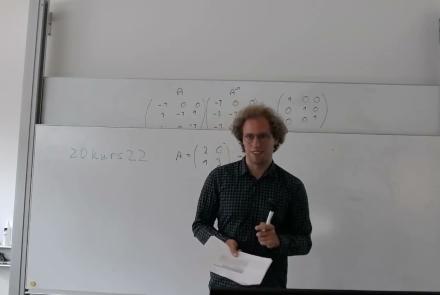Manipulate the default connectome provided with TVB to see how structural lesions effect brain dynamics. In this hands-on session you will insert lesions into the connectome within the TVB graphical user interface (GUI). Afterwards, the modified connectome will be used for simulations and the resulting activity will be analysed using functional connectivity.
Difficulty level: Beginner
Duration: 31:22
Speaker: : Paul Triebkorn
Course:
The Mouse Phenome Database (MPD) provides access to primary experimental trait data, genotypic variation, protocols and analysis tools for mouse genetic studies. Data are contributed by investigators worldwide and represent a broad scope of phenotyping endpoints and disease-related traits in naïve mice and those exposed to drugs, environmental agents or other treatments. MPD ensures rigorous curation of phenotype data and supporting documentation using relevant ontologies and controlled vocabularies. As a repository of curated and integrated data, MPD provides a means to access/re-use baseline data, as well as allows users to identify sensitized backgrounds for making new mouse models with genome editing technologies, analyze trait co-inheritance, benchmark assays in their own laboratories, and many other research applications. MPD’s primary source of funding is NIDA. For this reason, a majority of MPD data is neuro- and behavior-related.
Difficulty level: Beginner
Duration: 55:36
Speaker: : Elissa Chesler
Course:
This lecture presents an overview of functional brain parcellations, as well as a set of tutorials on bootstrap agregation of stable clusters (BASC) for fMRI brain parcellation.
Difficulty level: Advanced
Duration: 50:28
Speaker: : Pierre Bellec
This opening lecture from INCF's Short Course in Neuroinformatics provides an overview of the field of neuroinformatics itself, as well as laying out an argument for the necessity for developing more sophisticated approaches towards FAIR data management principles in neuroscience.
Difficulty level: Beginner
Duration: 1:19:14
Speaker: : Maryann Martone
This lesson aims to define computational neuroscience in general terms, while providing specific examples of highly successful computational neuroscience projects.
Difficulty level: Beginner
Duration: 59:21
Speaker: : Alla Borisyuk
This lecture covers a wide range of aspects regarding neuroinformatics and data governance, describing both their historical developments and current trajectories. Particular tools, platforms, and standards to make your research more FAIR are also discussed.
Difficulty level: Beginner
Duration: 54:58
Speaker: : Franco Pestilli
Introduction of the Foundations of Machine Learning in Python course - Day 01.
High-Performance Computing and Analytics Lab, University of Bonn
Difficulty level: Beginner
Duration: 35:24
Speaker: : Elena Trunz
Optimization for machine learning - Day 02 lecture of the Foundations of Machine Learning in Python course.
High-Performance Computing and Analytics Lab, University of Bonn
Difficulty level: Advanced
Duration: 34:52
Speaker: : Moritz Wolter
Linear Algebra for Machine Learning - Day 03 lecture of the Foundations of Machine Learning in Python course.
High-Performance Computing and Analytics Lab, University of Bonn
Difficulty level: Advanced
Duration: 57.45
Speaker: : Moritz Wolter
Support Vector Machines - Day 06 lecture of the Foundations of Machine Learning in Python course.
High-Performance Computing and Analytics Lab, University of Bonn
Difficulty level: Advanced
Duration: 53.39
Speaker: : Elena Trunz
Decision Trees and Random Forests - Day 07 lecture of the Foundations of Machine Learning in Python course.
High-Performance Computing and Analytics Lab, University of Bonn
Difficulty level: Advanced
Duration: 1:15:39
Speaker: : Elena Trunz
Clustering and Density Estimation - Day 08 lecture of the Foundations of Machine Learning in Python course.
High-Performance Computing and Analytics Lab, University of Bonn
Difficulty level: Advanced
Duration: 59:35
Speaker: : Elena Trunz
Dimensionality Reduction - Day 09 lecture of the Foundations of Machine Learning in Python course.
High-Performance Computing and Analytics Lab, University of Bonn
Difficulty level: Advanced
Duration: 51:02
Speaker: : Elena Trunz
Introduction to Neural Networks - Day 10 lecture of the Foundations of Machine Learning in Python course.
High-Performance Computing and Analytics Lab, University of Bonn
Difficulty level: Advanced
Duration: 54:12
Speaker: : Moritz Wolter
Introduction to Convolutional Neural Networks - Day 11 lecture of the Foundations of Machine Learning in Python course.
High-Performance Computing and Analytics Lab, University of Bonn
Difficulty level: Advanced
Duration: 42:07
Speaker: : Moritz Wolter
Initialization, Optimization, and Regularization - Day 12 lecture of the Foundations of Machine Learning in Python course.
High-Performance Computing and Analytics Lab, University of Bonn
Difficulty level: Advanced
Duration: 42:07
Speaker: : Moritz Wolter
U-Nets for medical Image-Segmentation - Day 13 lecture of the Foundations of Machine Learning in Python course.
High-Performance Computing and Analytics Lab, University of Bonn
Difficulty level: Advanced
Duration: 16:45
Speaker: : Moritz Wolter
Sequence Processing - Day 15 lecture of the Foundations of Machine Learning in Python course.
High-Performance Computing and Analytics Lab, University of Bonn
Difficulty level: Advanced
Duration: 47:45
Speaker: : Moritz Wolter
Course:
Presented by the OHBM OpenScienceSIG, this lesson covers how containers can be useful for running the same software on different platforms and sharing analysis pipelines with other researchers.
Difficulty level: Beginner
Duration: 01:21:59
Speaker: : Tom Shaw & Steffen Bollmann
This lecture provides an introduction to optogenetics, a biological technique to control the activity of neurons or other cell types with light.
Difficulty level: Beginner
Duration: 39:34
Speaker: : Adam Packer
Topics
- Artificial Intelligence (5)
- Philosophy of Science (5)
- Notebooks (2)
- Provenance (2)
- protein-protein interactions (1)
- Extracellular signaling (1)
- Animal models (2)
- Assembly 2021 (29)
- Brain-hardware interfaces (13)
- Clinical neuroscience (11)
- International Brain Initiative (2)
- Repositories and science gateways (6)
- Resources (6)
- General neuroscience
(13)
- (-) Phenome (1)
- (-)
General neuroinformatics
(16)
- Computational neuroscience (92)
- Statistics (2)
- Computer Science (8)
- (-) Genomics (24)
- Data science
(20)
- (-) Open science (25)
- Project management (6)
- Education (2)
- Neuroethics (27)


















